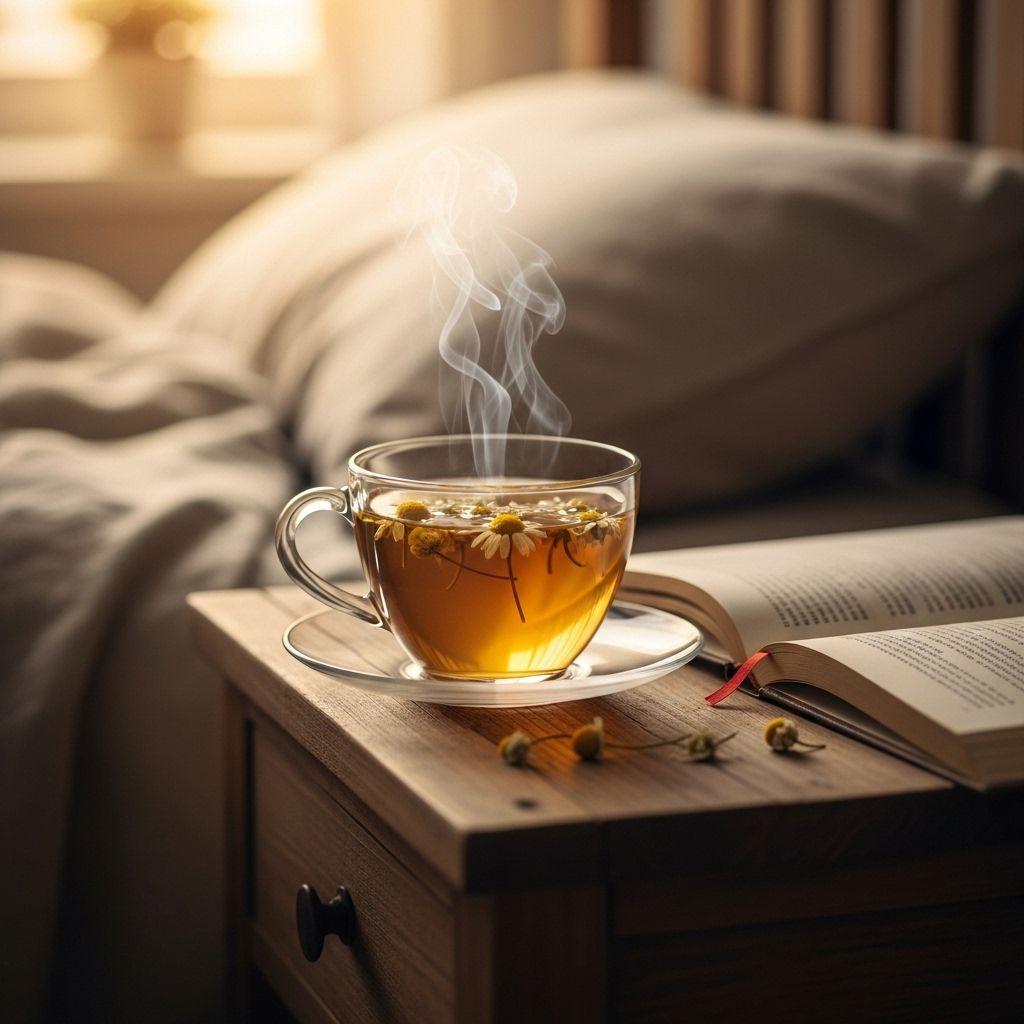How Chamomile Tea Transformed My Sleep: Evidence, Experience, and Science
Discover how chamomile tea can improve sleep quality, reduce insomnia, and gently promote relaxation—supported by research and expert advice.

If you find yourself tossing and turning at night, you’re not alone. Millions of people worldwide struggle with insomnia and poor sleep, leading to exhaustion, stress, and decreased overall well-being. Driven by curiosity and hope, I embarked on a journey to see whether chamomile tea—a centuries-old herbal remedy—could genuinely improve my sleep quality. In this article, I’ll unravel what happened during my personal experiment, delve into current scientific evidence, and offer practical advice on integrating this gentle remedy into your nightly routine.
What Is Chamomile Tea?
Chamomile tea is an herbal infusion made from the dried flowers of the Matricaria chamomilla (German chamomile) or Chamaemelum nobile (Roman chamomile) plants. With its mild, floral aroma reminiscent of apples, chamomile tea has served as a traditional remedy for relaxation, sleep, and digestive issues for centuries in various cultures.
Chamomile is caffeine-free, safe for most people, and widely available in both loose-leaf and bagged forms.
- German chamomile: More commonly used in sleep teas, known for higher levels of active compounds.
- Roman chamomile: Sometimes used for its slightly different flavor and aroma.
Why I Decided to Try Chamomile Tea for Sleep
Like many adults, I was facing increasingly difficult nights: trouble falling asleep, waking up too early, and feeling groggy throughout the day. Rather than jump straight to prescription sleep aids—which often carry side effects and dependency risks—I wanted something gentle, natural, and affordable. Chamomile tea seemed to check all the boxes:
- No caffeine
- Easily accessible
- Few known side effects
- Reputed to work for relaxation and sleep
How Chamomile Tea May Help with Sleep: Scientific Insights
But could a simple herbal tea really help? Scientific research suggests that chamomile may promote sleep through various mechanisms:
- Mild sedative effects: Chamomile contains the flavonoid apigenin, which binds to benzodiazepine receptors in the brain, helping initiate relaxation and sleep.
- Reduction in sleep onset latency: Several clinical studies found that chamomile can help individuals fall asleep more quickly and maintain sleep longer.
- Improved sleep quality: Studies in elderly populations and those with insomnia show significantly better sleep quality scores after chamomile consumption.
- Lowers daytime dysfunction and drowsiness: Participants using chamomile reported fewer wake-ups and more refreshed mornings.
What Research Actually Says About Chamomile and Sleep
To dig deeper, let’s examine the most relevant studies:
| Study | Population | Results | Highlights |
|---|---|---|---|
| Chamomile vs. Passion Flower (2025) | Adults 25-45 with insomnia | Chamomile improved sleep quality, reduced sleep latency, enhanced daytime alertness, and decreased sleep medication use. | Greatest improvement in sleep parameters compared to both passion flower and control groups. |
| Chamomile Extract in Elderly (2017) | Elderly adults in nursing homes | Chamomile extract significantly improved sleep quality (P<0.05). | Safe, effective, and well-tolerated for older adults. |
| Meta-Analysis (12 Trials) | Varied populations (RCTs) | Chamomile improved sleep quality overall. | Noted sedative effect from apigenin; more benefit in those with higher insomnia baseline. |
Key Outcomes:
- Chamomile tea caused the highest improvement in sleep quality scores as measured by research scales.
- Sleep-onset latency (the time it takes to fall asleep) was cut nearly in half for the chamomile group versus control.
- Chamomile users reported waking fewer times each night and feeling more refreshed in the morning.
- Daytime dysfunction, often caused by poor sleep, was most reduced in chamomile groups.
- Participants relied less on prescription sleep medications after regular chamomile use.
Potential Benefits Beyond Sleep
Chamomile tea’s benefits extend beyond sleep, with research suggesting possible effects in other areas:
- Anxiety reduction
- Anti-inflammatory action
- Relief for digestive issues (nausea, stomach ulcers)
- Menstrual pain and mood changes
- Support for cardiovascular health
- Minor analgesic (pain relief)
Some additional suggested uses from historical and recent studies include headache relief, immune support, and antioxidant protection. However, most of these require further research in human populations for strong clinical evidence.
My Personal Experience with Chamomile Tea: A Nightly Routine
Inspired by the evidence, I committed to drinking a cup of chamomile tea every evening about 45 minutes before bed for four weeks. Here’s what I observed:
- Falling asleep faster: Within the first week, I noticed I was spending less time awake, reading or thinking before drifting off. Instead of taking 20-30 minutes to relax, I managed to fall asleep closer to 10-15 minutes most nights.
- Improved sleep maintenance: Previous wake-ups around 2–3 AM became less frequent, and when I did wake, it was easier to fall back to sleep.
- Feeling more refreshed: By week three, I woke up with a sense of greater restfulness and energy, making it easier to tackle the day.
- Calmer evening mood: The gentle ritual of preparing and sipping the tea added calmness and helped establish a relaxing bedtime routine.
While there were nights where stress or external factors still disturbed my sleep, the overall trend was toward deeper, more consistent rest.
How to Make Chamomile Tea for Sleep
- Use high-quality dried flowers or reputable teabags. Organic sources may offer stronger flavors and effects.
- Boil fresh water and pour over your chamomile (about 1–2 teaspoons per cup or one teabag).
- Cover and steep for 5–10 minutes to ensure extraction of key components.
- Drink your cup 30–45 minutes before bedtime for best results.
- Optional: Add a slice of apple, a dash of honey, or a stick of cinnamon for flavor. Avoid adding caffeine-containing ingredients.
Possible Downsides and Precautions
- Allergic reactions: People with allergies to ragweed, daisies, or chrysanthemums may also react to chamomile.
- Drug interactions: Chamomile can interact with blood thinners or sedatives—consult with your healthcare provider if you use these.
- Pregnancy and breastfeeding: Generally regarded as safe, but always check with your doctor if pregnant or nursing.
- Not a cure-all: Chamomile helps many people but is not guaranteed to fully resolve severe insomnia or sleep disorders.
Chamomile is generally well-tolerated, with research rarely citing adverse reactions in controlled dosages.
Chamomile Tea vs. Other Sleep Aids
| Sleep Remedy | Caffeine Content | Common Side Effects | Dependency Risk | Research Support |
|---|---|---|---|---|
| Chamomile Tea | None | Rare allergies, mild sedation | Minimal | Strong (multiple RCTs) |
| Melatonin Supplements | None | Headaches, vivid dreams | Low | Moderate (helpful for circadian issues) |
| Prescription Sedatives | None | Drowsiness, dependence, withdrawal | High | Strong, but not for long-term use |
| Valerian Root | None | Digestive upset, drowsiness | Minimal | Mixed (less robust than chamomile) |
Chamomile stands out for its gentle effect, low risk of dependency, and strong research support compared to other herbal sleep remedies or OTC medications.
Tips for Getting the Most from Chamomile Tea
- Use a consistent bedtime routine: Combine chamomile tea with dim lighting, meditation, or gentle stretches.
- Limit screen time: Blue light from screens can counteract chamomile’s effects; switch to books or podcasts instead.
- Track your sleep: Keep a sleep diary to monitor progress and note patterns.
- Stay hydrated: Don’t drink other caffeinated beverages near bedtime.
- Consult your doctor: Particularly if you have chronic insomnia or take other medications regularly.
Frequently Asked Questions (FAQs)
Q: How quickly does chamomile tea work for sleep?
A: Most people report feeling relaxation effects within 30–45 minutes of drinking chamomile tea. While immediate improvements can occur, consistent nightly use over several weeks leads to the greatest gains in sleep quality.
Q: Can chamomile tea cause next-day grogginess?
A: Chamomile is mild and non-habit forming. Unlike some prescription sedatives, it’s unlikely to cause morning grogginess for most people.
Q: Is chamomile tea effective for chronic insomnia?
A: Evidence supports its role in improving sleep onset, duration, and quality in mild to moderate insomnia, particularly in adults and elderly populations. Chronic or severe insomnia may require a multifaceted approach with behavioral, medical, or psychological components.
Q: Is chamomile tea safe for children?
A: While chamomile is generally safe, parents should consult pediatricians before administering it to children, especially due to possible allergies.
Q: Should I combine chamomile tea with other sleep supplements?
A: Combining chamomile tea with other supplements (like melatonin or valerian) can increase sedative effects. Always discuss with your healthcare provider to avoid interactions or unintended side effects.
Who Should Try Chamomile Tea for Sleep?
- Adults seeking a gentle, natural sleep aid
- Elderly individuals wishing to promote restful sleep safely
- People hoping to reduce sleeping medication use
- Anyone interested in building healthy, relaxing nighttime rituals
If you have persistent sleep problems unaffected by lifestyle changes or experience daytime exhaustion, consult a sleep professional for a personalized plan.
Final Thoughts: A Gentle Ritual for Better Sleep
Chamomile tea offers a safe, soothing, and evidence-backed way to improve sleep quality, reduce insomnia symptoms, and enhance relaxation. Whether you’re seeking a mild remedy for restless nights, or want to build healthier evening habits, the science and tradition behind chamomile make it a worthy companion. Start tonight—brew a cup, slow down, and discover the difference in your sleep.
Read full bio of Sneha Tete












